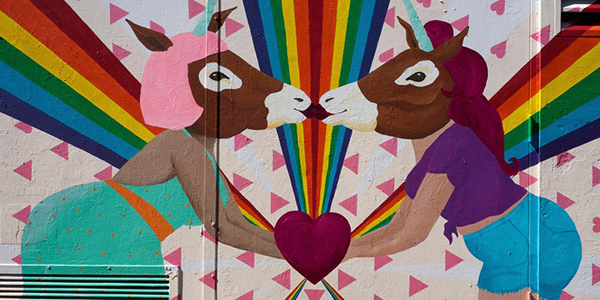
February 7, 2017, by Paula Akpan
Thoughts on Intersections: In Conversation with Nottingham’s LGBT community
Yesterday, I attended the Intersections talk at Nottingham Contemporary, funded by the Right and Justice Research Priority Area (RPA). Presented by Ibtisam Ahmed, Campaigns Coordinator of the LGBT+ Network at The University of Nottingham, the event included a panel of representatives from six different organisations from around Nottinghamshire that work with the LGBT+ community. These organisations included the Notts Trans Hub, QTIPOC Notts, Outburst, Out in Education, and the LGBT Networks from both The University of Nottingham and Nottingham Trent University.
Each organisation highlighted issues with intersectionality in their relative areas, for example, Jo from Outburst, an organisation that seeks to support LGBT+ young people between 12-25, highlighted the homophobia that young people can face is school from teachers, while Kelly and Jack from Out in Education, a not-for-profit that delivers workshops and assemblies to tackle homophobia in school, touched on how their work is often seen as throwing a spanner in the works for teachers and parents. While raising many valid points, the overall panel discussion felt education-heavy at times and it would’ve been interesting to touch on other facets of community life such as being LGBT+ or queer in a workplace.
A huge highlight for me was the presentation given on “Pride spirit” by Sam Hope, a trans activist from the Notts Trans Hub, who, despite being a white person, centred trans and queer people of colour throughout in a way that felt genuine and heartening, with many of their points resonating with me. These were reiterated by Ibtisam whose role during the discussion was as a representative of QTIPOC Notts (Queer, Trans and Intersex People of Colour) with his humorous and astute observations on the fetishism and emotional labour that queer people of colour find themselves navigating on a regular basis. However, throughout important conversations on tokenism, I was unable to ignore that, on a panel of seven people, he was the only person of colour and in a room of about 25 or so people, I was the only black person.
Like one of the speakers said, everyone who attended the event already has an interest in issues affecting the LGBT+ community so in future, it may be a matter of defining objects more clearly – if we’re looking to engage people who are not with in the LGBT+ community, how do we do that? If this is an event aimed more toward those in the LGBT+ community or those who consider themselves allies of the LGBT+ community, then how do we go about building on these connections? And how do we continue to represent different marginalised identities within this growing community who remain on the periphery, such as those whose LGBT+ and queer identities intersect with their social class, mental and physical health issues and disabilities and so on?
The intersections event is the first of many important dialogues that needs to be taking place in Nottingham and can be considered a step in the right direction, however as always, there’s still work to be done.
I live-tweeted the event for People and Culture and you can view the Storify here or see it as a slide show below.
No comments yet, fill out a comment to be the first

Leave a Reply